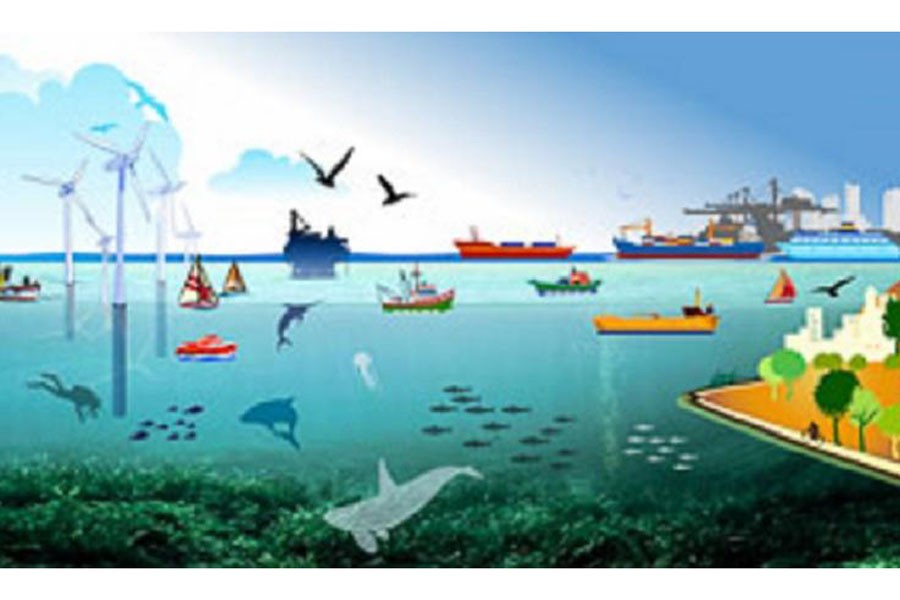There were high hopes after the settlements of maritime disputes with India and Myanmar to unlock the potential of the 'blue economy'. But the government has failed to make any substantial progress other than setting up a small 'cell' under the Energy Division of the power ministry.
After a lapse of about three years since the settlement, the Blue Economy Cell (BEC) was set up in January last year on a temporary basis. The cell still remains merely a small organ of the Energy Division headed by a Director General with only six officials and employees from different organisations posted on a temporary basis.
The BEC was, in fact, launched to coordinate among the agencies involved in exploring offshore resources. It engaged a 25-member unit headed by an additional secretary. Until today, no significant progress has been made in exploring the offshore resources, particularly after settlement of the maritime boundary dispute. Eight to nine divisions and ministries are involved in exploring offshore resources and potential.
Back in 2014, the government had formed a 25-member 'Coordination Committee on Sea Resources Exploration and Fair Management' headed by principal secretary to the Prime Minister's Office for taking up strategic planning in this regard. The committee comprising senior secretary, secretaries and top executives of different ministries and important organisations was supposed to sit every three months, prepare strategies and monitor implementations of the government's decision on the issue.
But nobody of the BEC could confirm whether the committee sat for any meeting during the last three years. In fact, the relevant agencies failed to make any move forward mainly because of lack of manpower. It's pretty difficult to work with a small group of people posted on a temporary basis. The officials are still drawing salaries from their respective organisations, not from the BEC.
The parliamentary standing committee on power, energy and mineral resources ministry in its recent meeting made a strong recommendation to convert the BEC into an authority with a permanent set up. On the basis of the recommendation, the BEC is reported to have been working to prepare a draft organogram for the government's approval.
The blue economy is a sustainable development framework which looks at oceans as 'Development Spaces' that provide benefits for current and future generations while ensuring that the integrity and functioning of coastal and ocean systems is maintained. It is based on principles of equity, low carbon development, resource efficiency and social inclusion, and recognises that the oceans have a major role to play in humanity's future.
The vast sea areas are thought to be rich in hydrocarbon and minerals, fishes and other marine resources. Within 19 months of the settlement of maritime boundary with Bangladesh, Myanmar discovered a large gas reserve in the bay adjacent to Bangladesh's sea waters. Bangladesh, however, made no significant progress in exploring the hydrocarbon potential and other marine resources in the offshore area.
The development of blue economy demands new partnerships among stakeholders within and across countries, regions, sub-regions, international agencies and the private sector to facilitate greater flows of expertise, finance, and capacity to effectively close the gap in sustainable management of both fisheries and non-living sea resources.
In Bangladesh, sustainable use of maritime resources can play an important role in boosting the economy. But the current situation with harnessing potential of the Blue Economy is really frustrating. Many say it is happening due to the government's lack of interest in exploration of resources including oil, gas and fisheries in the bay. It is also surprising that the government couldn't take any decision on multi-client seismic survey in offshore areas.
Without acquiring seismic data, it's impossible to make any assessment of the resources in the Bay of Bengal. The concerned authorities have so far failed to import a marine fisheries research vessel in the last six years after floating tenders which is meant to conduct survey on marine fisheries.
The country does have a dearth of skilled manpower, extensive research, technological capacity and knowledge in oceanography to exploit the resources. There is also a dearth of data regarding phytoplankton, or occurrence of bioactive molecules. On the other hand, proper surveys are needed in the field of marine aquatic products, materials for biotechnology and others.
India, China and other ocean-rim countries are harnessing marine resources through mutual cooperation among themselves. Bangladesh should seek both technical cooperation and foreign direct investment (FDI) from countries like Japan, India, Canada, the Philippines and South Africa in this regard.
All said and done, the BEC should be made an authority employing skilled manpower with a permanent set up. Otherwise, it will be difficult for it to move ahead for executing the government's ambitious offshore plan.


